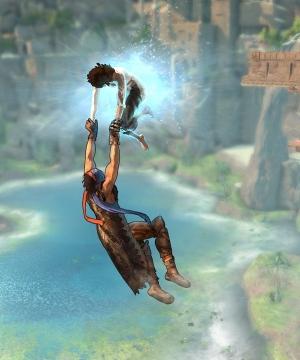Therefore, send not to know
For whom the bell tolls,
It tolls not for thee.
Okay, so I may have done a little editing there, but it's true--modern game characters don't really ever die. Think back to the days of Mario, when losing a life could be the difference between losing an hour of your own life and having the time of your life. No worries though. You can always start over. The concept of lives and Game Over screens are a vestigial aspect of arcade games, long before home consoles were created. People became accustomed to the idea and so, it stuck. But as the industry progressed, so too did the role of death. Instead of players suspending their beliefs to participate in a game, death as a mechanic and death as a philosophy intertwine in the games of today.
Game developers have done death in creative ways. Prince of Persia works with the idea that you can control time and go back to the point when you were still living. In one game of the series, the main character is saved by the princess Elika, who swoops in and stops you from dying. But after one boss fight, Elika is frozen in time and the only way to revive her is to take a leap of faith, forcing her out of her frozen state to catch you. In that one moment, for the first time in the game, death becomes very real for the player.
 |
| Elika saves the prince. Again. Source: EMagill |
Games like Prince of Persia threaten the player with death(as it should be) and add tension to a typically monotonous and unexplained game mechanism. In Halo 2, you play as the human super-solider Master Chief, arguably the only person who could save the known universe, and yet, you die and respawn over and over with the only consequence being mild annoyance. One could hypothesize that in games like this, when you die and respawn you're actually in an alternate dimension where you haven't died yet. Although, this is more of the philosophy. What about the mechanic?
In games, it's the simplest mechanic. You fall in a pit of spikes and, naturally, you die. If there's no fear of dying or failing the level, then there's less of a challenge and a game becomes boring. Games like Dark Souls emphasize death with high difficulty and challenge. Within the game, dying means losing all of your items, starting from the last save, and then going at it all over again(just thinking about it makes me want to burn the disk). So it really all depends on what game developers want to do--highlight or underplay death. Either option has its perks, but it still feels like most games treat death as an annoying tickle in the back of your throat, a hiccup on your interactive journey to the end, but then again, there are times when the narrative is more important than punishing the player.
 |
| Death defying time controls in Braid |
In Super Meat Boy, an indie platform game, death becomes your tutorial. The main character, Meat Boy, can perform a great deal of stunts like double jumping, hopping up walls, and leaping over great distances, none of which you'd find out about with dying first. As Meat Boy, the only way your adventure continues is through death, as you instantly respawn and learn about your character and the world he lives in. The point of the game is to beat the levels as quickly as possible, so dying does become a hindrance. You have to become Meat Boy if you want to be the fastest.
 |
| In Super Meat Boy, you can see all your deaths on the same level at the same time. Source: SuperMeatBoy.com |
Death is a challenge that game developers face. It asks a thousand questions and creates a million answers, but what we're seeing lately are the same solutions over and over again. Is that necessarily a bad thing? Maybe not, but neither is breaking the mold. The way a game deals with death has adverse effects on game play, narrative, and overall experience. We've seen some successful games turn death into a valuable part of the experience. Next time you hear the bell toll, don't wonder if it's for you--wonder when it'll toll next.
Special thanks to Jared Ashcraft for letting me pick apart his brain.


 11:33 PM
11:33 PM
 Lissy
Lissy

 Posted in:
Posted in: 


0 comments:
Post a Comment